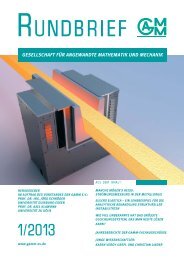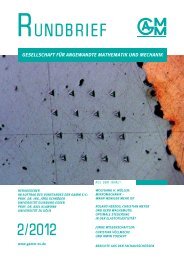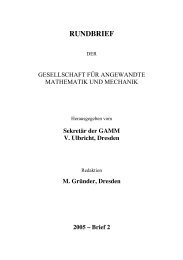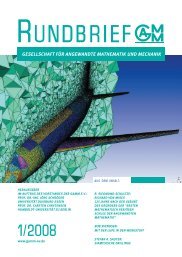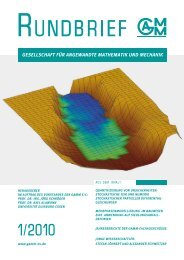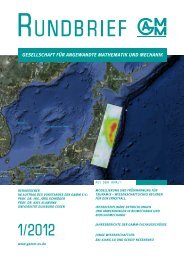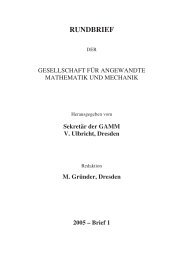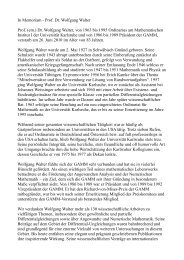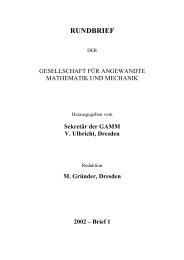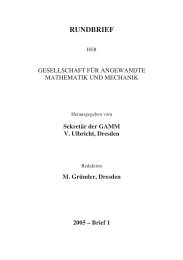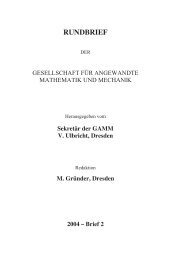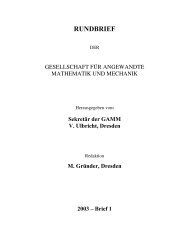GAMM Rundbrief 2002/Heft 2
GAMM Rundbrief 2002/Heft 2
GAMM Rundbrief 2002/Heft 2
Create successful ePaper yourself
Turn your PDF publications into a flip-book with our unique Google optimized e-Paper software.
Wissenschaftliche Tagungen 83<br />
March 01, 2003: Notification of acceptance (oral or poster). Start of registrations.<br />
Preliminary programme is drawn up and made<br />
available on the Web site.<br />
May 01, 2003: Deadline for registration at a reduced fee. Registration<br />
deadline for authors of oral presentations. Final programme<br />
available on the Web site.<br />
June 30, 2003: Deadline for the reservation of pre-booked hotel rooms.<br />
The 5th European Fluid Mechanics Conference will be held at the Centre des Congrès<br />
Pierre Baudis in Toulouse (France) and is organised by the Local Organising<br />
Committee from the Institut de Mécanique des Fluides de Toulouse.<br />
Jacques Magnaudet (Chairman); Jean Fabre (Treasurer); France Alquier (Secretary)<br />
Jean-Félix Alquier; Alessandro Bottaro; Catherine Colin; Patricia Ern; Frédéric Risso.<br />
EFMC2003 Conference Office<br />
Address: Institut de Mécanique des Fluides de Toulouse<br />
Allée Camille Soula<br />
31400 Toulouse, France<br />
Fax: + 33 (0)5 61 28 59 42<br />
E-mail: efmc2003@imft.fr<br />
Web: www.imft.fr/efmc2003/<br />
All correspondence can be directed to the EFMC2003 Conference Office.<br />
The conference will be held at the: Centre des Congrès Pierre Baudis, 11 esplanade<br />
Compans Caffarelli 31000 Toulouse.<br />
September 08 - December 13, 2003<br />
Inverse Problems: Computational Methods and Emerging Applications<br />
IPAM, UCLA, Los Angeles<br />
First Announcement of a Special Semester.<br />
Inverse problems are problems where causes for a desired or an observed effect are to<br />
be determined. They have, nearly always driven by applications, been studied for nearly<br />
a century now. An important key feature, both theoretically and numerically, of inverse<br />
problems is their ill-posedness, i.e., they do not fulfill Hadamard´s classical<br />
requirements of existence, uniqueness and stability, under data perturbations, of a<br />
solution: Solutions of an inverse problem might not exist for all data (e.g., a consistent<br />
temperature history exists only for a very smooth final temperature in the model of the<br />
classical heat equation), it might not be unique (which raises the practically relevant<br />
question of identifiability, i.e., the question if the data contain enough information to<br />
determine the desired quantity), and it might be unstable with respect to data<br />
perturbations. The last aspect is of course especially important, since in real-world<br />
problems, measurements always contain noise (another source of noise being errors in<br />
numerical procedures), and approximation methods for solving inverse problems which<br />
are as insensitive to noise as possible have to be constructed, so-called regularization<br />
methods.



